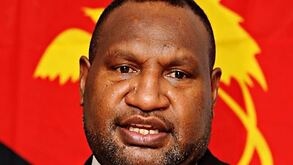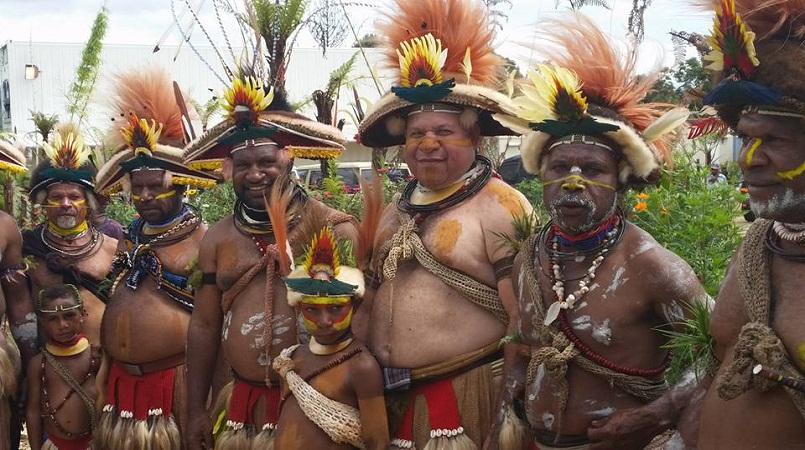 |
| PM James Marape pm402 |
--ACW
Papua New Guinea's parliament has
elected former finance minister James Marape as the country's new prime
minister. Here's a look at the new leader.
James Marape was elected yesterday as the eight prime minister of Papua New Guinea, but he was already a leader.
Mr Marape is a leader of the Huli people - one of the largest tribes in the country - and he defines his life by their ancient customary code.
Trust and loyalty are central to Huli culture in the turbulent PNG highlands and it was those factors he cited when resigning as finance minister from his predecessor Peter O’Neill’s government in April.
After serving Mr O’Neill loyally for seven years, he felt his
policy advice was being ignored and he no longer had the faith or trust
of his leader. So he quit.
The 48-year-old graduated from the University of PNG in 1993 with a Bachelor in Arts and honours in environmental science.
First entering parliament in 2007 as a National Alliance Party candidate, he was appointed a minister for education in then prime minister Sir Michael Somare’s government.
When Mr O’Neill deposed Sir Michael in 2011, Mr Marape joined the new prime minister's People’s National Congress (PNC) party and after the 2012 election was made finance minister.
During the tumultuous O’Neill government, he loyally served and was the confidante of his leader.
Together they faced down arrest warrants issued by the anti-corruption body Taskforce Sweep that the O’Neill government established and then abolished.
His election in 2012 was in the seat of Tari-Pori in a newly created province called Hela.
Carved out from the Southern Highlands Province, the home of the world-famous Huli wigmen, it inherited little infrastructure, poor roads, little electricity, and a broken health and education system.
Mr Marape promised to fix this for his Huli people using the expected millions in royalties from PNG’s first LNG project. But progress was much slower than expected.
A combination of the battered global economy and over-optimistic forecasts wiped out revenues and the windfall from LNG never eventuated.
Along with Mr O’Neill, as finance minister he was heavily criticised by the Ombudsman’s Commission over a $1.23billion loan scandal with Swiss bank USB with which PNG bought a stake in ASX-listed Oil Search and enabled the LNG project.
He was re-elected in 2017 in controversial circumstances.
Voting was beset by violence and election observers questioned the excess ballots to the number on the electoral roll in the seat.
He was reappointed finance minister in the O’Neill government.
When Mr Marape resigned in April this year, he blamed being excluded from negotiations by Mr O’Neill on an even bigger $16billion LNG project with resource companies Total, ExxonMobil and Oil Search.
His move came as the 18-month, post-election lock-out period for a parliamentary “vote of no confidence” (VONC) in the government was nearing.
It led to the defection of dozens of government MPs and Mr Marape quit the PNC and joined the Pangu Party.
Mr O’Neill’s leadership was never put to the test in parliament. He resigned as prime minister which then saw Mr Marape elected with the support of 101 of the 111 MPs.
In his maiden speech as prime minister, Mr Marape promised to review “outdated” resource and mining legislation, not to be pushed around by foreign corporations and ensure services were provided for his people with a fair share of revenues.
He concluded by stating his vision was for PNG to become “the richest, black, Christian nation on planet earth”.
Mr Marape is a leader of the Huli people - one of the largest tribes in the country - and he defines his life by their ancient customary code.
Trust and loyalty are central to Huli culture in the turbulent PNG highlands and it was those factors he cited when resigning as finance minister from his predecessor Peter O’Neill’s government in April.
The 48-year-old graduated from the University of PNG in 1993 with a Bachelor in Arts and honours in environmental science.
First entering parliament in 2007 as a National Alliance Party candidate, he was appointed a minister for education in then prime minister Sir Michael Somare’s government.
When Mr O’Neill deposed Sir Michael in 2011, Mr Marape joined the new prime minister's People’s National Congress (PNC) party and after the 2012 election was made finance minister.
During the tumultuous O’Neill government, he loyally served and was the confidante of his leader.
Together they faced down arrest warrants issued by the anti-corruption body Taskforce Sweep that the O’Neill government established and then abolished.
His election in 2012 was in the seat of Tari-Pori in a newly created province called Hela.
Carved out from the Southern Highlands Province, the home of the world-famous Huli wigmen, it inherited little infrastructure, poor roads, little electricity, and a broken health and education system.
Mr Marape promised to fix this for his Huli people using the expected millions in royalties from PNG’s first LNG project. But progress was much slower than expected.
A combination of the battered global economy and over-optimistic forecasts wiped out revenues and the windfall from LNG never eventuated.
Along with Mr O’Neill, as finance minister he was heavily criticised by the Ombudsman’s Commission over a $1.23billion loan scandal with Swiss bank USB with which PNG bought a stake in ASX-listed Oil Search and enabled the LNG project.
He was re-elected in 2017 in controversial circumstances.
Voting was beset by violence and election observers questioned the excess ballots to the number on the electoral roll in the seat.
He was reappointed finance minister in the O’Neill government.
When Mr Marape resigned in April this year, he blamed being excluded from negotiations by Mr O’Neill on an even bigger $16billion LNG project with resource companies Total, ExxonMobil and Oil Search.
His move came as the 18-month, post-election lock-out period for a parliamentary “vote of no confidence” (VONC) in the government was nearing.
It led to the defection of dozens of government MPs and Mr Marape quit the PNC and joined the Pangu Party.
Mr O’Neill’s leadership was never put to the test in parliament. He resigned as prime minister which then saw Mr Marape elected with the support of 101 of the 111 MPs.
In his maiden speech as prime minister, Mr Marape promised to review “outdated” resource and mining legislation, not to be pushed around by foreign corporations and ensure services were provided for his people with a fair share of revenues.
He concluded by stating his vision was for PNG to become “the richest, black, Christian nation on planet earth”.

No comments:
Post a Comment